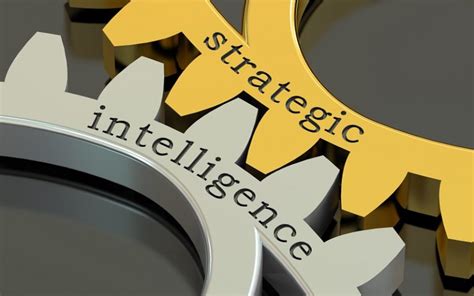Introduction

In today’s rapidly evolving world, the demand for professionals with strategic intelligence has skyrocketed. Governments, corporations, and organizations of all sizes are seeking individuals with the skills to analyze complex information, make informed decisions, and anticipate future trends. A strategic intelligence degree provides the critical foundation for success in this field.
What is Strategic Intelligence?
Strategic intelligence involves gathering, analyzing, and interpreting information to understand an organization’s operating environment, identify potential opportunities and threats, and develop effective strategies. It encompasses a wide range of disciplines, including:
- Data analysis
- Economic and political analysis
- Risk assessment
- Scenario planning
- Forecasting
Degree Programs in Strategic Intelligence
Universities and colleges offer undergraduate and graduate programs in strategic intelligence. These programs typically provide a comprehensive education in the following areas:
- Data Management and Analytics: Students learn to collect, analyze, and visualize data to identify patterns and trends.
- International Relations and Politics: Courses explore the complexities of global politics, international organizations, and geopolitical dynamics.
- Economics and Finance: Students gain an understanding of economic indicators, financial markets, and their impact on business and policy decisions.
- Risk Management and Decision-Making: Programs equip students with the tools to identify and mitigate risks, develop contingency plans, and make informed judgments.
Career Opportunities
Graduates with a strategic intelligence degree pursue a wide range of careers, including:
- Intelligence Analyst
- Risk Manager
- Policy Analyst
- Strategic Planner
- Consultant
Benefits of a Strategic Intelligence Degree
Pursuing a strategic intelligence degree offers numerous benefits, including:
- High Earning Potential: According to the U.S. Bureau of Labor Statistics, Intelligence Analysts earn an average annual salary of over $84,000.
- Diverse Job Market: Strategic intelligence graduates are sought after by governments, private corporations, non-profit organizations, and international agencies.
- Intellectual Challenge: The field of strategic intelligence is intellectually stimulating and requires constant learning and analysis.
Applications of Strategic Intelligence
Strategic intelligence has a wide range of applications in various industries and sectors, including:
- National Security: Predicting threats, developing defense strategies, and identifying vulnerabilities.
- Business Planning: Identifying market opportunities, assessing competitive landscapes, and mitigating risks.
- Public Policy: Informing decision-making on issues such as healthcare, education, and environmental sustainability.
- Investment Management: Making informed investment decisions by analyzing market data and forecasting future trends.
Innovation in Strategic Intelligence
Enterprisescape: A term coined to describe the ability to think at the intersection of business, technology, and geopolitical trends, enabling organizations to anticipate and adapt to change.
Tables
Table 1: Courses in a Strategic Intelligence Degree Program
| Course | Objectives |
|---|---|
| Data Analytics | Collect, analyze, and visualize data to identify patterns and trends. |
| International Relations | Explore global politics, international organizations, and geopolitical dynamics. |
| Economics | Gain an understanding of economic indicators, financial markets, and their impact on business and policy decisions. |
| Risk Management and Decision-Making | Identify and mitigate risks, develop contingency plans, and make informed judgments. |
Table 2: Career Opportunities for Strategic Intelligence Graduates
| Career | Description |
|---|---|
| Intelligence Analyst | Collects, analyzes, and interprets information to identify and assess threats and opportunities. |
| Risk Manager | Identifies, assesses, and mitigates risks to an organization’s operations and reputation. |
| Policy Analyst | Develops and analyzes policies to address complex societal issues. |
| Strategic Planner | Creates long-range plans to guide an organization’s strategic direction. |
| Consultant | Provides strategic advice and guidance to governments, corporations, and non-profit organizations. |
Table 3: Benefits of a Strategic Intelligence Degree
| Benefit | Description |
|---|---|
| High Earning Potential | Intelligence Analysts earn an average annual salary of over $84,000. |
| Diverse Job Market | Graduates are sought after by governments, private corporations, non-profit organizations, and international agencies. |
| Intellectual Challenge | The field requires constant learning and analysis, providing intellectual stimulation. |
Table 4: Applications of Strategic Intelligence
| Industry | Application |
|---|---|
| National Security | Predicting threats, developing defense strategies, and identifying vulnerabilities. |
| Business Planning | Identifying market opportunities, assessing competitive landscapes, and mitigating risks. |
| Public Policy | Informing decision-making on issues such as healthcare, education, and environmental sustainability. |
| Investment Management | Making informed investment decisions by analyzing market data and forecasting future trends. |
Conclusion
A strategic intelligence degree prepares individuals with the analytical, problem-solving, and decision-making skills to succeed in a complex and ever-changing world. By understanding the dynamics of global politics, economics, and business, graduates are equipped to anticipate trends, identify opportunities, and develop effective strategies for organizations of all kinds.
